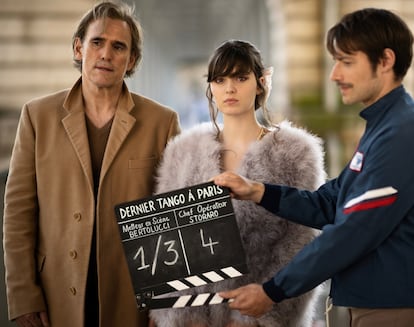Maria (Being Maria), Jessica Palud’s film about Maria Schneider, aims to reclaim the voice of the actress from The last Tango in Paris (1972) but it comes to nothing, a stuffy and simplistic review of a filming surrounded by bad practices, abuse and controversy. Palud’s film, screened in the Cannes Premiére section of the French film festival, is inspired by the book My Cousin Maria Schneider, in which the performer’s cousin Vanessa Schneider recounts in the second person and with an elegiac tone the life of a woman who was a victim not only of the reprehensible behavior of Marlon Brando and Bernardo Bertolucci during the filming of that legendary film but also of the film industry, that cruelly pigeonholed her in erotic roles, and by society, which condemned her participation in a film that was born surrounded by scandal.
If the book is a strenuous effort to get away from the clichés that marked Schneider’s life—the girl broken by sex and drugs—Jessica Palud’s film is exactly that, one commonplace after another without any further effort to try to figure out. What happened between the filming of the film and its tragic fate. With a vulgar Manichaeism, the director of Maria links the sequence of sodomization with butter as lubricant, in which Schneider felt “violated” by Brando and Bertolucci by hiding all the details of what they were going to shoot, with that of her first contact with heroin. In this reductionist reading there is no room for much more.
However, the worst thing about the film is what has to do with filming with Brando and Bertolucci. Matt Dillon is a caricature in the skin of the myth and all the sequences around that filming are ridiculous, pure papier-mâché. The film, which never abandons the actress’s point of view, does not dare to try to offer a more complex and broader view. It is obvious that Schneider was a victim of the filmmaker’s strategy, who looked for an inexperienced 19-year-old actress for an erotic film alongside an actor with a reputation for being difficult and much older than her. Bertolucci only cared about Brando, and that relegated the actress to a mere accessory. The director of María He began working in cinema at the age of 19 precisely with the Italian filmmaker, as worthy of Dreamers (2003), but as he explained in Cannes, “the betrayal” that Schneider suffered has made him lose the admiration he felt for the director.
Schneider also did not forgive Bertolucci for the maneuver and Brando had a conflictive relationship with the film. The actor ended up feeling psychologically outraged in the famous sequence in which he digs into his own memory, marked by his violent relationship with his father. Perhaps the hardest thing for the actress was that she, in some way, the actor of A Streetcar Named Desire He represented for her the father figure she never had. The actor treated her well until the butter episode. She knew that the director wanted more intensity and aggressiveness in the shot, but no one consulted him about the idea of lubricant. It was filmed in a single take and seeing the sequence now, knowing that her tears and her helplessness are real, is unbearable. Schneider lived an ordeal for years because of this: they even made a butter with her image and shortly after the premiere a flight attendant left a packet of butter on the plane table as a joke.
Her father, the actor Daniel Gélin, did not take care of her during her childhood, and her mother, Marie-Christine Schneider, did not behave much better either. The sex life of her mother, who did not even deign to go to her daughter’s funeral when she died in 2011 at age 42, was also traumatic for her. In another passage of My Cousin Maria Schneider, The actress remembers how, when she was a child, her mother was in bed with a man and asked him to bring her midriff closer to her.
Maria Schneider’s funeral was attended by two of the people who cared for her the most, Alain Delon and Brigitte Bardot, and actresses such as Dominique Sanda and Christine Boisson, the star of Emmanuelle, another actress who suffered the ravages of erotic cinema in the seventies. The emergence of sex in cinema had devastating consequences for countless actresses. The men—producers, directors and actors who were children of their time—mistreated many of them, whom they saw as mere sexual objects to attract the public. Maria Schneider is a symbol of everything that was done wrong in those years and that today, fortunately, would generally be unthinkable. And although Maria It is there to remember it, it does so in such a crude and insubstantial way that it is reduced to a mere temporary product.
Subscribe to continue reading
Read without limits
_

